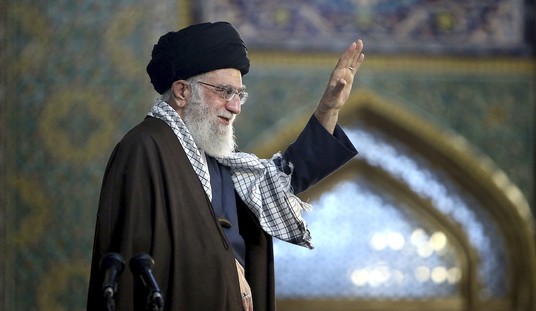Iranian gunboats have just had a helluva a ride in that seagoing squeeze known as the Strait of Hormuz. Their little fast attack skiffs and gunboats have been playing chicken with U.S. Navy vessels, while flat -out hijacking oil tankers and merchant ships transiting the strait for years now, all with relative impunity.
Even with U.S. naval patrol vessels in range, the Iranians will let fly with a fusillade in an attempt to get an oil tanker crew to swing the ship to them. They’ll run alongside, swarming the vessel and commanding the ship to stop, even as they unleash a volley of shots.
And then they scoot out just as quickly as they zipped in if our guys arrive on-scene.
An Iranian warship fired on an oil tanker off the coast of Oman before leaving the scene after U.S. naval forces arrived, U.S. 5th Fleet announced on Wednesday.
Early Wednesday morning, Iranian warships attempted to seize two commercial tankers. Iranian personnel fired multiple shots while attempting to take oil tanker Richmond Voyager, according to the Navy release.
USS McFaul (DDG-74), as well as surveillance assets, including an MQ-9 Reaper and Navy P-8A Poseidon maritime patrol aircraft, responded to the two attempted seizures.
Iran has seized an #oil tanker in the Strait of Hormuz, the US Navy said. That's Iran's second vessel interception in a week.#OOTT #shipping pic.twitter.com/5y83PbeT2n
— Commodity Insights Oil (@SPGCIOil) May 3, 2023
Since 2021, even with the U.S. stepping up patrols, the Iranians have scored some hefty prizes on the water…
…The Iranian Navy, as well as the sectarian military force Islamic Revolutionary Guard Corps Navy, have increased attempts to seize commercial ships over the past couple of years. Iran has harassed, attacked or seized 20 internationally-flagged ships since 2021, according to the Navy.
Earlier this year, Iranian forces seized two tankers within a week of each other, USNI News reported in May.
The U.S. increased its rotation of ships and aircraft that patrol the Strait of Hormuz in early May after Iran seized two commercial vessels within a week.
…and cost everyone significant time, money and heartburn.
But they may have finally overplayed their hand and could well be in for a surprise soon when they pick a potential target out.
US Navy sailors and Marines are in training for a possible mission to board merchant ships in the Strait of Hormuz to counter Iranian aggression https://t.co/25aCCVblZb
— Bloomberg (@business) August 3, 2023
The proposal under discussion would be a serious escalation in terms of security in the Strait and the issuance of a bare-faced FAFO challenge to Iranians.
The U.S. military is considering putting armed personnel on commercial ships traveling through the Strait of Hormuz, in what would be an unheard of action aimed at stopping Iran from seizing and harassing civilian vessels, five American officials told The Associated Press on Thursday.
…The contemplated move also would represent an extraordinary commitment in the Mideast by U.S. forces as the Pentagon tries to focus on Russia and China. America didn’t even take the step during the so-called “Tanker War,” which culminated with the U.S. Navy and Iran fighting a one-day naval battle in 1988 that was the Navy’s largest since World War II.
While officials offered few details of the plan, it comes as thousands of Marines and sailors on both the amphibious assault ship USS Bataan and the USS Carter Hall, a landing ship, are on their way to the Persian Gulf. Those Marines and sailors could provide the backbone for any armed guard mission in the strait, through which 20% of the world’s crude oil passes.
Iran is blustering that “we don’t need no stinking foreigners…” to protect shipping from Iranian predation.
…The deployment has captured Iran’s attention, with its chief diplomat telling neighboring nations that the region doesn’t need “foreigners” providing security. On Wednesday, Iran’s paramilitary Revolutionary Guard launched a surprise military drill on disputed islands in the Persian Gulf, with swarms of small fast boats, paratroopers and missile units taking part.
They’re doing just fine on their own, thank you, and don’t need anyone messing with their success.
The Iranians have masterfully manipulated the current American distaste for armed high seas confrontation, but that string of relative license to behave badly may be coming to an end.
…America, though, is concerned about freedom of navigation in one of the world’s most vulnerable economic arteries. In May, Iranians seized two tankers, including the Marshall Islands-flagged Advantage Sweet, which had been chartered by Chevron Oil.
While Arab allies in the region were disappointed with America’s response, action on several consequent incidents appeared more muscular. In early July the U.S. Navy said it prevented an Iranian attempt to take over two commercial tankers in international waters in the Gulf.
…Ever since Secretary Clinton coined the Obama-era term “pivot to Asia,” Washington has attempted to decouple from the Mideast. Armed forces in the region were reduced in size. To lower American casualties in anti-terrorism operations, unmanned weapons, such as drones, replaced pilot-steered warplanes. As a result, Tehran’s willingness to take military risks increased.
America’s “interest in unmanned assets may be cost-efficient, but perhaps self-defeating in the long run,” an Iran watcher at the Foundation for Defense of Democracies, Behnam ben Taleblu, says. “The Islamic Republic may be more inclined to mess with unmanned assets than manned ones, given lessons learned about the U.S. threshold for the use of force across several domains of competition in the region.”
…Yet, as Mr. Ben Taleblu says, “it is not just the forces we bring into the region, but what we do with them” that counts.
Tehran was rattled by the announcement of the Bataan and her sister ships being rerouted to the Gulf.
With word of the intention to provide onboard security to vessels requesting the same, what happens to the Iranian game of chicken?
Will the fowl still cross the Strait to FAFO, or go home to roost?








Join the conversation as a VIP Member